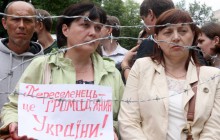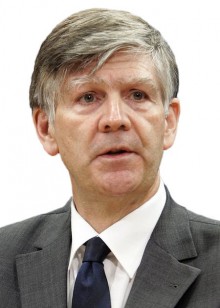Late in September 2016, Kyiv hosted a meeting discussion with UN Representative Walter Kaelin, which dealt with the issue of internal migration caused by the Russian aggression in the Donbas and Crimea. Accordingly, the title of the event was “How to Best Help Internally Displaced Persons in Ukraine.” It should be noted that Kaelin has a lot of experience in the field since he has worked on internally displaced persons issues in many countries.
The meeting also featured newly appointed Minister for Temporarily Occupied Territories and Internally Displaced Persons of Ukraine Vadym Chernysh, who in turn shared his vision of solving these situations. However, Chernysh did not mention Russia even once in his brief speech. In our conversation with Kaelin, the UN official also tried to avoid the theme of Russian aggression against Ukraine. Kaelin arrived in Ukraine to study the situation of internally displaced persons under conditions of a drawn-out, effectively “frozen” conflict. But journalists, unlike cautious diplomats, still need to emphasize that the very existence of so-called internal migrants is the result of specific criminal acts committed by Russia.
“THE WORLD HAS VARIOUS ARRANGEMENTS FOR COMPENSATING INTERNALLY DISPLACED PERSONS”
Mr. Kaelin, how well have you studied the issue of internally displaced persons in Ukraine?
“I am still at it at the moment. Of course, I am less well-informed than you, the people who are directly facing these problems. But I have my experience of studying such issues. Commissioned by the UN, I examined the overall situation concerning internally displaced persons. The conflict has really drawn out, and therefore the migrant issue has been drawn out as well. My task was to carefully examine this issue in five countries, Ukraine included. I learned what national governments had done in order to cope with these problems, and what else could be done.”
Your experience includes countries that have fallen victims precisely of Russian aggression, just like Ukraine. How much has the West realized that the problem of internally displaced persons arose precisely because of such aggression, and therefore it is Russia that sooner or later will have to compensate affected Ukrainian citizens for their material and moral damages? Just like Germany compensated people who it caused damages and woes.
“This is not exactly part of my mandate. But speaking from my experience, I have encountered situations where people who had been internally displaced were then paid compensation. For example, it was that way in the situation with Cyprus after a Turkish armed invasion. Internally displaced persons turned to the European Court of Human Rights and sought compensation in that case. Similarly, there are a number of claims awaiting decision which relate to the situation in Nagorno-Karabakh. The world has various arrangements for such compensations. But regarding Ukraine, it is difficult to say anything, because everything is too complicated here, and, I repeat, it is not part of my mandate.”
“EUROPE IS AWARE OF RUSSIA’S ROLE IN THIS CONFLICT”
But nevertheless, Russia invaded Ukraine and should answer for it. For Ukrainians, it is also important whether the Europeans understand the fact that it is the aggression of Russia against Ukraine, and that there is no internal conflict in Ukraine.
“Europe is aware of Russia’s role in this conflict. But I am not competent to talk about it now.”
I noticed that your bio mentions that you were involved in the protection of human rights in the conflict between Iraq and Kuwait. As far as I know, Iraq is still paying compensation to Kuwait for its aggression. They were able to carry out this procedure. Is it realistic for Ukraine?
“This is true. I was appointed Special Rapporteur on this issue in 1991 and my work was part of the compensation commission’s activities. The facts with which I worked became the basis for payment decisions of the commission. The mechanism of compensation and the decision on it were adopted by the Security Council. It might be much more confusing and difficult process in your case.”
Does the scope of your mandate include a trip to the occupied territories to study the problems of Ukrainian citizens living there?
“No. My role is solely to work on the free territory of Ukraine, and the purpose of my visit is to explore ways to improve the situation of the internally displaced persons who have trouble finding shelter or job as well as adapting to new conditions. That is, we are dealing here with a case where the direct humanitarian assistance is over, and we need to establish what to do next after direct, immediate humanitarian assistance. I have realized that it is not a priority for the government of Ukraine right now. This is my conclusion. Furthermore, many world-class players also do not see it as a priority. In my opinion, the Ukrainian government should develop a strategy of how to improve the situation of the internally displaced persons and how to work out mechanisms to facilitate their adaptation to local communities where they go.”
“THE APPOINTMENT OF A MINISTER FOR THE OCCUPIED TERRITORIES IS A POSITIVE STEP”
That is to say that you are not satisfied with our government’s efforts in this sector?
“I think if you compare Ukraine’s record in solving the migrant issues with that of other countries who find themselves in similar situations, Ukraine has coped quite well. You do not have people living in tent cities at least. But the real issue is the situation existing now, with the conflict having drawn out and people unable to get home for quite a long time. We must decide what the next step should be. After all, many of these people cannot find a job and therefore cannot build their future. Their plans are uncertain which prevents them from having normal lives and developing. If nothing is done, these people will become even poorer over time, and they are a major part of the nation. Then, their problems will become problems not only for the internally displaced persons, but for the entire nation and for their new hometowns. The government must have a development strategy, and one of the components of this strategy should be assisting citizens. I emphasize that working with the internally displaced persons should become part of the national strategy. If we look at the experience of Georgia, we see that for many years, almost nothing was done to resolve the internal migrants situation there. The government of Georgia started to take concrete steps to help these citizens adapt only some time before 2010. Ukraine has the opportunity to avoid this and reach right conclusions in time. I think that the appointment of a minister for the occupied territories is a positive step in this regard.”
“LEARNING ABOUT MIGRANTS’ PROBLEMS FIRST HAND WILL BE USEFUL FOR ME”
Are there any specific programs involving European resources which would help to implement this strategy?
“This discussion is starting right now. Last week, the Cabinet of Ministers of Ukraine agreed to create a special fund in cooperation with international organizations. I personally spoke with several organizations that have the potential to become donors for such programs. But without a clear strategy, it will be very hard to attract their assistance. I emphasize that the issue of internal migration needs a clear plan formulated as part of the national strategy. To make it happen, we need to work with the migrants, and learning about their problems first hand and in person will be useful for me as well. For example, I am aware of the well-known issue with checkpoints on the contact line where citizens have to queue for long hours. On the one hand, we can understand the Ukrainian side which should ensure maximum security of the free territory. On the other hand, there are effective mechanisms of passage that would make creating unnecessary problems for civilians just impossible. After all, these people, on the free and the occupied territories alike, are citizens of Ukraine and thus entitled to freedom of movement.”









